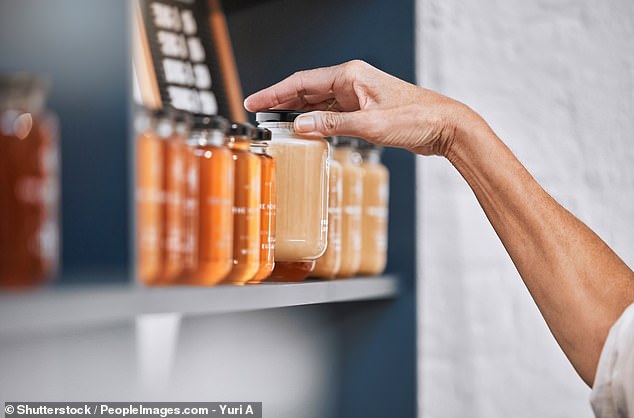Nine out of ten honey products sold in British supermarkets are fake, researchers have found.
Shoppers are being duped into buying adulterated honey, often imported from abroad, that has been diluted with cheap sugar syrups, they say.
Last month the UK branch of the Honey Authenticity Network sent 30 honey samples to be tested for authenticity at a specialist laboratory in Estonia.
Only six – including five samples acquired direct from independent UK beekeepers – were found to be genuine.
The rest, which came from supermarkets and other big UK retailers, were found to be fake and likely bulked out with inexpensive rice or sugar beet syrups.
Lynne Ingram, a Somerset beekeeper and the chair of the Honey Authenticity Network UK, told the Observer: ‘The market is being flooded by cheap, imported adulterated honey and it is undermining the business of genuine honey producers. ‘The public are being misinformed, because they are buying what they think is genuine honey.’

The EU is working on advanced testing techniques to detect honey fraud and has passed new legislation to provide improved labelling of country of origin on jars of honey (file image)

The majority of honey products sold in British supermarkets are fake, researchers have found (file image)

Lynne Ingram, a Somerset beekeeper and the chair of the Honey Authenticity Network UK, told the Observer: ‘The market is being flooded by cheap, imported adulterated honey’

A separate investigation by the European Union, published last year, found 46 per cent of 147 imported honey samples they analysed were likely to have been tampered with and were fraudulent – including all 10 samples from the UK.
The EU is working on advanced testing techniques to detect honey fraud and has passed new legislation to provide improved labelling of country of origin on jars of honey.
Paul Horton, a beekeeper and the owner of Apidae Honey in Lincolnshire, whose honey was analysed and found to be genuine by the Estonian laboratory, said a better testing regime was required and supermarkets should be encouraged to stock more British products.
‘We used to sell our honey in bulk to packers who would supply the supermarkets,’ he said. ‘That market has dwindled because the supermarkets aren’t stocking so much British honey.’
Last year almost £90m of honey was imported into the UK. A large proportion of such imports come from China, which is known to be targeted by fraudsters.
While honey importers insist the provenance of honey and supply chains are carefully audited, there is no consensus on how to analyse samples, or which tests are most reliable.

Last year almost £90m of honey was imported into the UK. A large proportion of such imports come from China, which is known to be targeted by fraudsters (file image)
The Celvia research institute, in Estonia, has developed a unique test to analyse the DNA composition of honey to determine if it is genuine. The test examines up to 20million DNA sequences in any given sample and compares them to the DNA of more than 500 genuine honeys, half of which originate in the northern European country, on their database.
Kaarel Krjutškov, director of the Celvia laboratory, said: ‘It is surprisingly easy to distinguish between the fake and authentic products. It is a huge gap.’
But a spokesman for the British Honey Importers and Packers Association (BHIPA) questioned the ‘veracity’ of tests carried out by commercial laboratories, ‘which discriminate against honeys from certain geographies.’
He said: ‘We remain supportive of any tests that help eliminate the potential sale of any substandard honey in the UK market, but their methodology, scientific basis and application needs to be fit for purpose and independently validated before they can be recognised for enforcement.
‘It is our strong belief that the vast majority of honey consumed in the UK is of a very high standard and is not fraudulent.’
This article was originally published by a www.dailymail.co.uk . Read the Original article here. .

